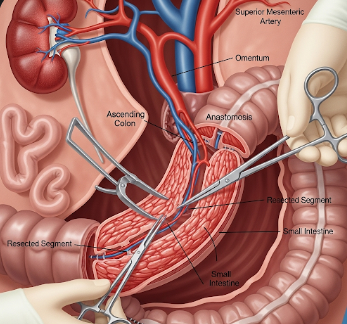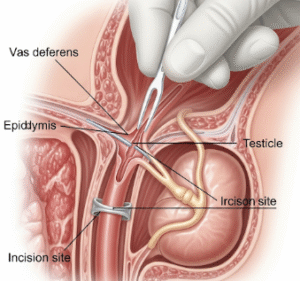Overview
Hemicolectomy is a surgical procedure that involves removal of one side (right or left) of the colon, often performed to treat colon cancer, diverticulitis, Crohn’s disease, or bowel obstruction. The procedure may be done using open surgery or minimally invasive laparoscopic techniques, depending on patient condition and surgeon preference.
South Korea is recognized for advanced colorectal surgical techniques, minimally invasive laparoscopic and robotic procedures, and comprehensive post-operative care, making it a top choice for patients seeking safe and effective hemicolectomy with optimal outcomes.
What is Hemicolectomy?
Hemicolectomy involves:
- Removal of a diseased portion of the colon (right or left hemicolectomy)
- Reconnection of the remaining colon segments (anastomosis) to maintain bowel continuity
- Optional removal of nearby lymph nodes if cancer is involved
- Minimally invasive approach using laparoscopy or robotic surgery for faster recovery and smaller incisions
Indications include:
- Colon cancer localized to one side of the colon
- Severe diverticulitis or recurrent infections
- Inflammatory bowel diseases such as Crohn’s disease
- Bowel obstruction due to benign or malignant causes
What are the Benefits?
- Removal of diseased colon segment → Reduces risk of complications or cancer progression
- Minimally invasive laparoscopic option → Smaller incisions, less pain, and faster recovery
- Restoration of bowel continuity → Patients regain normal bowel function over time
- High success rates in Korea due to experienced colorectal surgeons
- Comprehensive post-operative care → Early mobilization, nutrition management, and monitoring
- Robotic-assisted procedures available for precision in complex cases
Procedure Details
1) How should I prepare for Hemicolectomy?
- Preoperative evaluation → Blood tests, colonoscopy, imaging (CT, MRI), ECG, and pulmonary assessment
- Medication instructions → Adjust or stop blood thinners, anti-inflammatory drugs, or specific medications
- Bowel preparation → Laxatives or enemas to clean the colon prior to surgery
- Fasting → Typically 8–12 hours before surgery
- Pre-operative consultation → Discuss surgical approach, possible complications, recovery timeline, and post-operative care
2) What happens during the procedure Hemicolectomy?
- Anesthesia → General anesthesia with continuous monitoring
- Surgical steps →
- Right or left side of the colon is identified
- Diseased colon segment is removed
- Nearby lymph nodes may be dissected if cancer is present
- Remaining colon ends are reconnected (anastomosis)
- Laparoscopic or robotic approach involves smaller incisions, specialized instruments, and camera visualization
- Duration → 2–4 hours depending on complexity
- Monitoring → Continuous monitoring of vital signs and intraoperative blood loss
3) What happens after Hemicolectomy?
- Recovery room → Patient monitored until fully awake and stable
- Hospital stay → Typically 5–10 days depending on procedure and recovery
- Diet → Start with liquids, gradually progress to soft foods and regular diet
- Pain management → Oral or IV analgesics; minimally invasive approach reduces pain
- Activity restrictions → Avoid heavy lifting and strenuous activity for 4–6 weeks
- Follow-up visits → Monitor wound healing, bowel function, and overall recovery
Risks / Benefits
Risks
- ➤ Infection at incision sites or intra-abdominal infection
- ➤ Bleeding during or after surgery
- ➤ Anastomotic leak (rare)
- ➤ Bowel obstruction or ileus
- ➤ Blood clots (DVT/PE)
- ➤ Complications related to anesthesia
Benefits
- ➤ Effective removal of diseased colon segment
- ➤ Minimally invasive options reduce recovery time and post-operative pain
- ➤ High surgical success and low complication rates in Korea
- ➤ Restoration of normal bowel function and improved quality of life
- ➤ Access to advanced robotic and laparoscopic technology for complex cases
Recovery and Outlook
- Immediate recovery → Mild pain at incision sites, fatigue, and limited bowel movements
- Hospital stay → 5–10 days depending on procedure and patient health
- Diet and nutrition → Gradual reintroduction of food; nutritional counseling may be provided
- Return to normal activity → Light activity within 1–2 weeks; full recovery in 4–6 weeks
- Long-term outlook → Excellent when surgery is successful; regular follow-ups required for cancer patients
- Lifestyle adjustments → High-fiber diet, adequate hydration, and regular exercise for bowel health
South Korea provides comprehensive post-operative care, including pain management, nutritional guidance, rehabilitation, and close monitoring for complications, ensuring safe recovery and optimal long-term outcomes.
When To Call the Doctor
Contact your surgeon immediately if you notice:
- ⚠️ Fever, chills, or signs of infection
- ⚠️ Persistent abdominal pain or severe cramping
- ⚠️ Vomiting or inability to tolerate food
- ⚠️ Excessive bleeding from incision sites
- ⚠️ Changes in bowel habits or inability to pass stool
Best Korea Option / Process
South Korea is a leading destination for Hemicolectomy due to:
- Highly skilled colorectal surgeons with extensive experience
- Advanced laparoscopic and robotic surgical technology
- Comprehensive post-operative care including nutrition, rehabilitation, and monitoring
- Shorter hospital stays and faster recovery due to minimally invasive techniques
- International patient support, including language assistance, coordination, and follow-up care
Top Hospitals for Hemicolectomy in Korea:
- Asan Medical Center, Seoul – Expertise in colorectal cancer and minimally invasive surgery
- Samsung Medical Center – Advanced laparoscopic and robotic-assisted hemicolectomy
- Seoul National University Hospital (SNUH) – Comprehensive pre- and post-operative care
- Yonsei Severance Hospital – High success rates in complex colorectal procedures
👉 For patients with colon cancer, diverticulitis, or other serious colon conditions, Hemicolectomy in Korea offers safe, minimally invasive, and highly effective treatment with excellent long-term outcomes.













